'Always building': How Alex Tuch became a keystone in the Sabres' return to relevancy
Alex Tuch repeats the question to give himself a second to think.
"On the team …" he says slowly through a toothy grin, "who are the characters?"
Tuch leans back in a plastic chair inside the Buffalo Sabres' meal room at KeyBank Center. It's 8:30 a.m. on a practice day in late September. On a table sits a steamy cup of coffee - black - and a clipboard holding a half-solved USA Today crossword.
"Anders Bjork is a pretty big character," Tuch starts. "He's an interesting human being. I love him to death. You never know what he's gonna do or say." The 26-year-old forward continues: Ilya Lyubushkin is sneakily hilarious. Jeff Skinner is quirkier than he appears. Henri Jokiharju is loud on the ice, especially for a Finn. Rasmus Dahlin is fiery. "You catch the Swedes speaking in their native tongue because there's a few of them," Tuch says. "You're just sitting there, thinking, 'They could be chirping me right now …'"
A few minutes earlier, Tuch was chirped for real about his crossword abilities: "Always needs help, always asks me," teammate Tage Thompson blurted as he shuffled by the table.
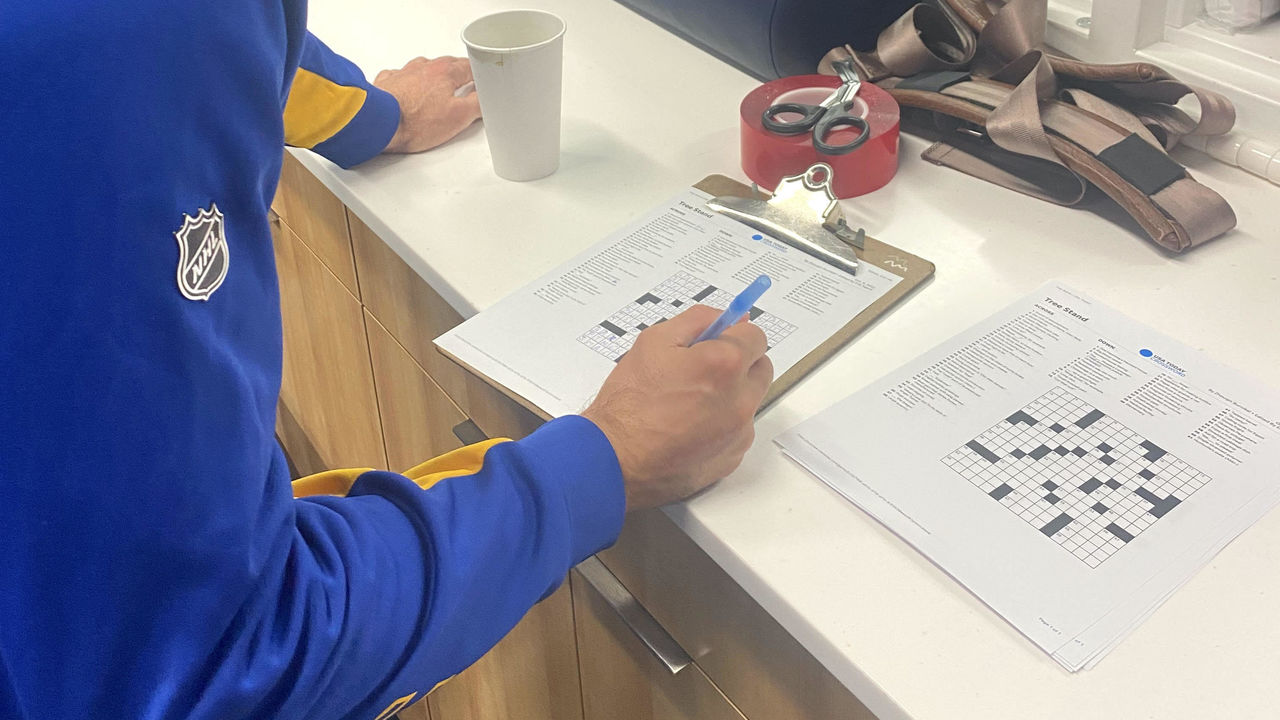
There's an unbound energy around the Sabres these days, and the gregarious, driven, and thoughtful Tuch - himself an unambiguous character - is at the center of it. The team's tone-setters, from general manager Kevyn Adams and head coach Don Granato to Tuch, new captain Kyle Okposo, and other members of the leadership group, are keeping the message consistent: We want growth, passion, and authenticity from everybody.
"Because why not?" Tuch says of the inviting vibe. "It makes life better."
Tuch has strong ties to the Sabres and upstate New York. The arena opened in 1996, the same year Tuch was born. He watched his first live game five years later, making the 150-mile drive from Baldwinsville with his dad. The Tuch family was next-door neighbors to former Sabre Tim Connolly. Becoming a die-hard fan was natural.
Of course, Tuch didn't cheer for the Sabres between being drafted by the Minnesota Wild in 2014 and traded by the Vegas Golden Knights in late 2021. "That'd be weird," he says.
Still, it was "painful" to see the fan base's frustration bubble to the point of exasperation with all the losing. "Eleven-year playoff drought. Biggest one ever," Tuch says. "It's not a minor disappointment. It's a big disappointment. It's something we're looking to change."
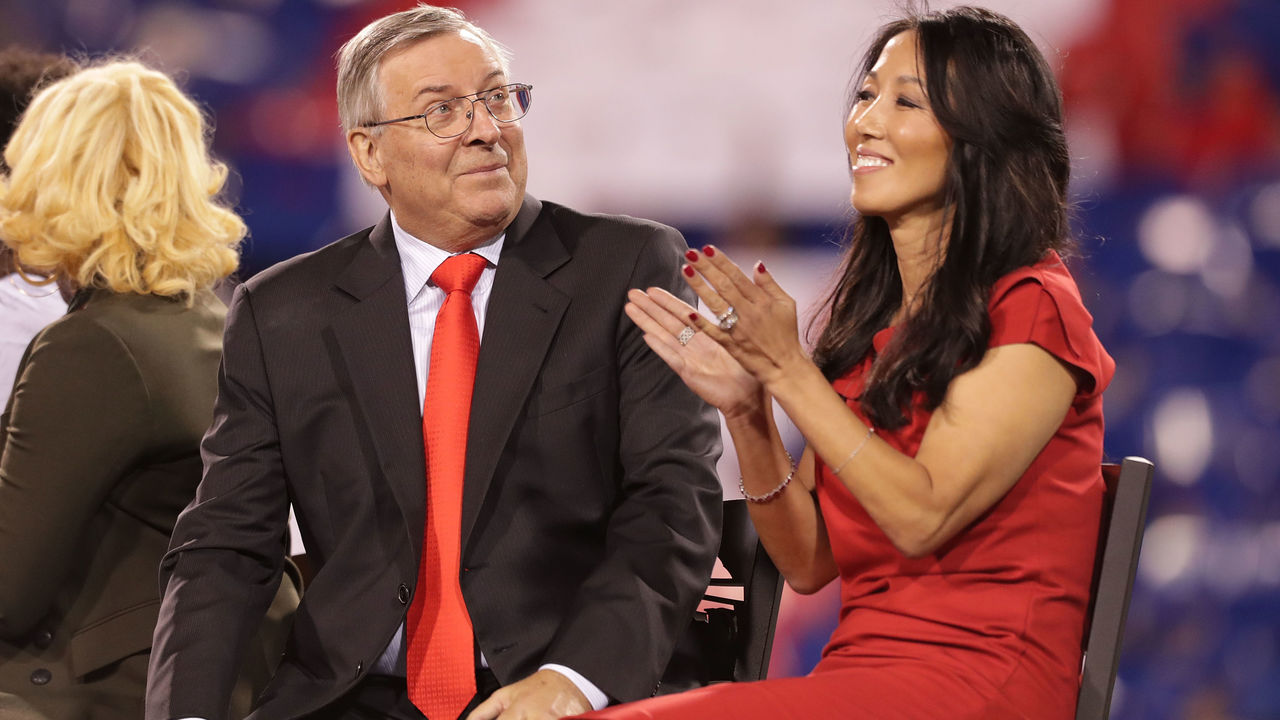
The Sabres, established in 1970, were purchased in 2011 by billionaire Terry Pegula and his wife, Kim. At the celebratory press conference, Pegula singled out a franchise icon in the crowd. "You are my hero," an emotional Pegula told Gilbert Perreault.
"I want to run the team to win the Stanley Cup. So whatever that involves, I guess we've gotta figure it out," Pegula, a lifelong fan, pledged. "If I want to make some money, I'll go drill a gas well. I don't need to make it in the hockey business."
The Sabres ended that first half-season under the Pegulas with 96 points and a playoff date. The Lindy Ruff-coached squad, led by sniper Thomas Vanek and star netminder Ryan Miller, lost a first-round series to the Flyers in seven games.
In the years since, the Sabres have failed to reach the playoffs but also failed to offer their fans appreciable progress. They've finished at the bottom of the league standings in four of the past nine seasons, missing the postseason cut line by an average of 26.2 points a year. (It jumps to 29.1 if the 2019-20 season is excluded. Painfully, Buffalo missed the cut for the 24-team playoff bubble by three points.)
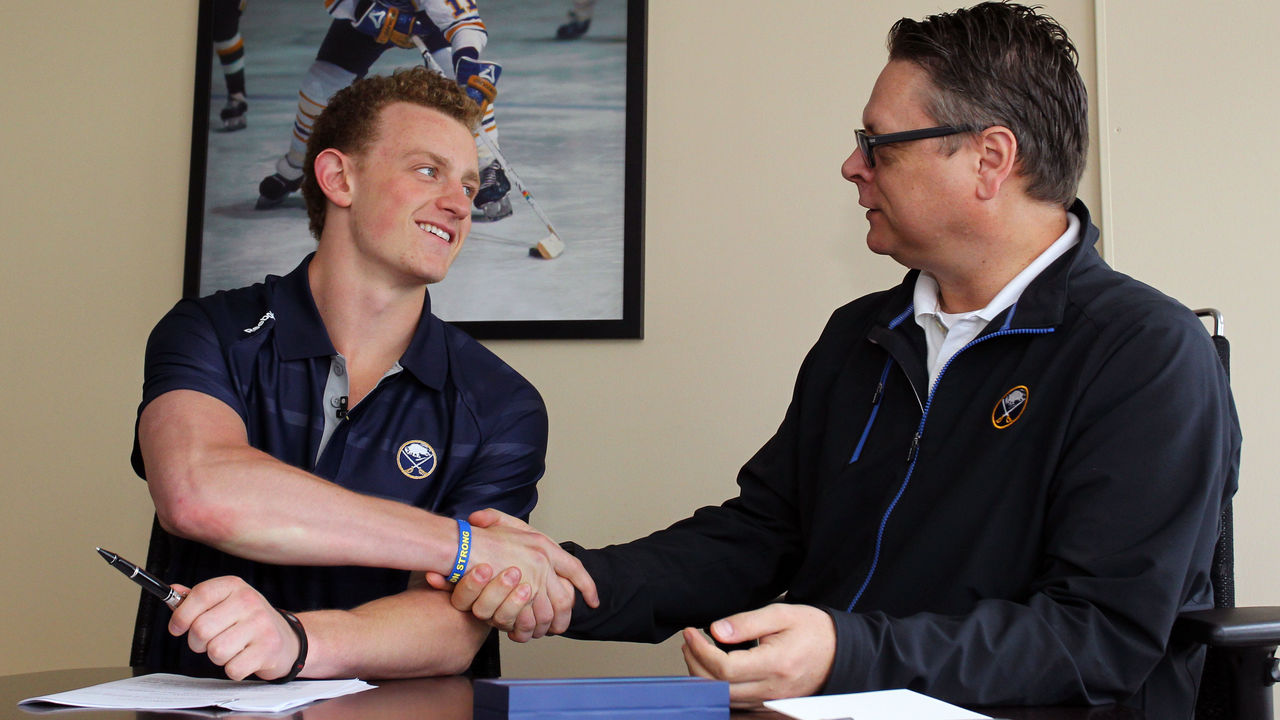
Jack Eichel, the consolation prize for the Sabres' blatant tank for Connor McDavid, was supposed to be the savior, starting in 2015-16. He thrived for stretches, but Eichel by and large was the face of the most miserable chapter in team history. Following a medical dispute, trade to Vegas, and prickly return to Buffalo, the former captain is now the opposite of a fan favorite.
Asked to reflect on his time as a Sabre, Eichel recently said he harbors no hard feelings toward the organization or fan base. Behind the pouty body language and behind-the-scenes drama checkering his tenure is a simple truth: Eichel and his teammates didn't win enough. "Things didn't work out there, you just move on," he said at the NHL/NHLPA media tour. "I'm not the first person who hasn't had success in a place and gone somewhere else."
Adams, named GM in June 2020, acquired Tuch, forward Peyton Krebs, a first-round pick, and a second-rounder for Eichel plus a third-rounder in a trade with the Golden Knights a little less than a year ago. Adams moved directly from the business side of the club to the corner office of hockey operations during arguably the lowest point of the playoff drought. The Pegulas, feeling the weight of the pandemic and unhappy with the on-ice product, had just started a firing spree that saw a whopping 22 people in managing, coaching, and scouting roles relieved of their duties.
Nine months later, Adams canned head coach Ralph Krueger and tapped Granato, then an assistant, to take over. At the time, the rookie GM was still revamping the roster and hockey ops department to fit his vision, funneling resources into video scouting, analytics, and sports science, while trying to shift the narrative internally and externally.
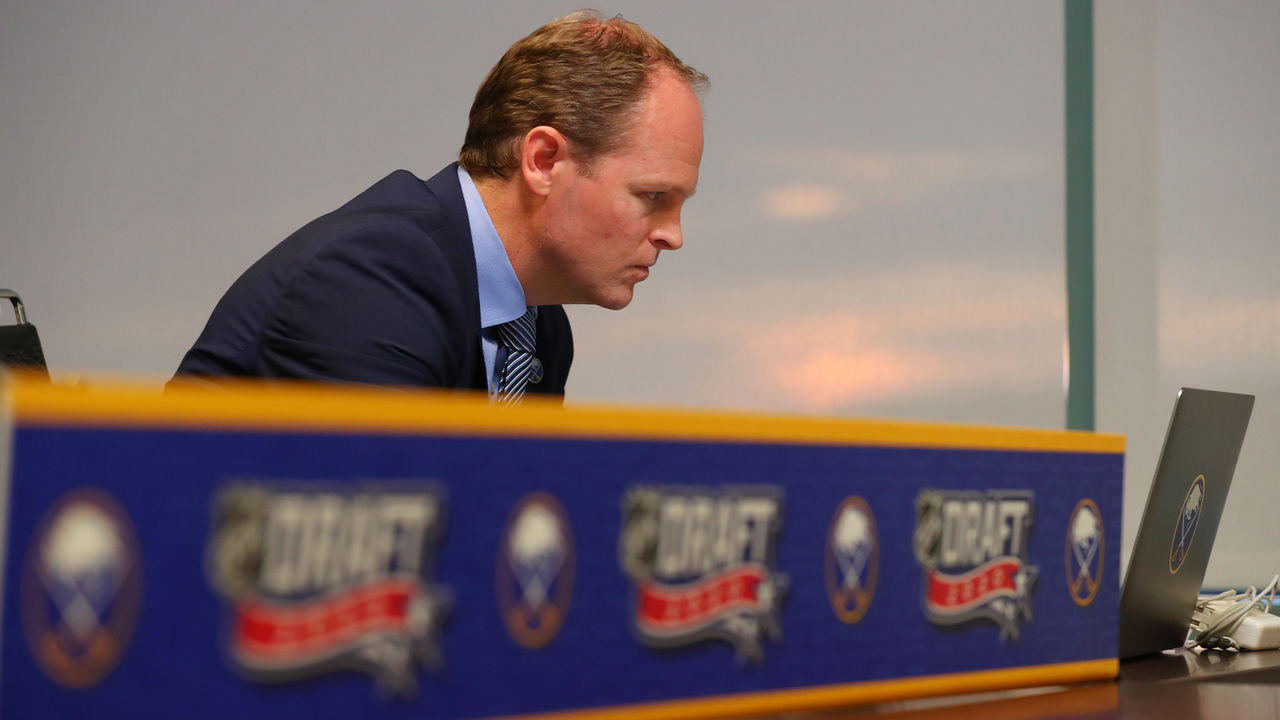
Adams is the ultimate everyman GM. Sure, he played 540 NHL games, but he's personable (talks about hockey in plain English), inclusive (surrounds himself with smart people), and relatable (safe clothing choices, receding hairline). Most interestingly, he's a semantics guy. In Adams parlance, the Sabres are amidst a "build" - not a "rebuild."
"Why that word is so important - build - is because you're always building," Adams tells theScore in a preseason interview. "For me, the way I look at this job is that it's always moving, always evolving. Decisions you're making are challenging whether you're just starting out and getting going or you've won a Stanley Cup. You're still building. That's the mindset I wanted to make sure everyone in our organization had. And that's not just on the ice. That's within the hockey operations, that's within the business department."
Intentional or not, this reframing untethers the 2022-23 Sabres, a young group with tremendous long-term potential, from past groups. Adams has spoken with coaches and players about understanding and recognizing the playoff drought, especially from the fan perspective, but not living in the past. What matters is the present moment.
"There's been a lot of stress in this organization and, on this organization, pressure, for the last decade," Granato says. "We all know that. Even from the outside, when you don't make the playoffs for a long time, that's going to wear on you pretty heavily."
The failures wore on former forward Ryan O'Reilly, who at the end of the 2017-18 season talked openly about the Sabres being "stuck in this mindset of just being OK with losing." O'Reilly admitted he personally "lost the love of the game multiple times."
"Your greatest asset," Granato says of being a coach, "is that you get to set that mood and that tone. That's No. 1 for me: to connect with your love for the game. We need our players to do that. There's lots of great places across the league, but this is an absolutely unbelievable place to take that approach. Because this is a hockey place."
Zemgus Girgensons is the Sabres' longest-serving player. He was drafted by Darcy Regier in 2012 and has worked under three other GMs (Tim Murray, Jason Botterill, Adams) and six coaches (Ron Rolston, Ted Nolan, Dan Bylsma, Phil Housley, Krueger, Granato). The current regime, he believes, is attacking the problem from a fresh angle.
"Both Kevyn and Don reach you at a personal level, on a deeper level," Girgensons says. "Before it was maybe more business, and you have to do your job and perform. This is more about seeing the game a different way and finding that passion for hockey."
He adds: "If you just change a coach and change a GM, and you don't change the attitude around the team, then nothing changes. It's just the people changing. So changing the attitude and the character of the room has meant a lot."
Around this time last year, as summer turned into fall and the puck dropped on another hockey season, Tuch was feeling out of sorts. He struggled physically and mentally throughout the 2021 offseason after undergoing shoulder surgery, and a return to the lineup wasn't near.
"You like being in control," Kylie Edwards, Tuch's fiancee, says to him following an afternoon walk with Teddy, the couple's golden retriever, the work day now over.
"Yeah, of situations," Tuch replies with a straight face. "And being able to have a say in outcomes, I guess you could say. When I don't, it's tough."
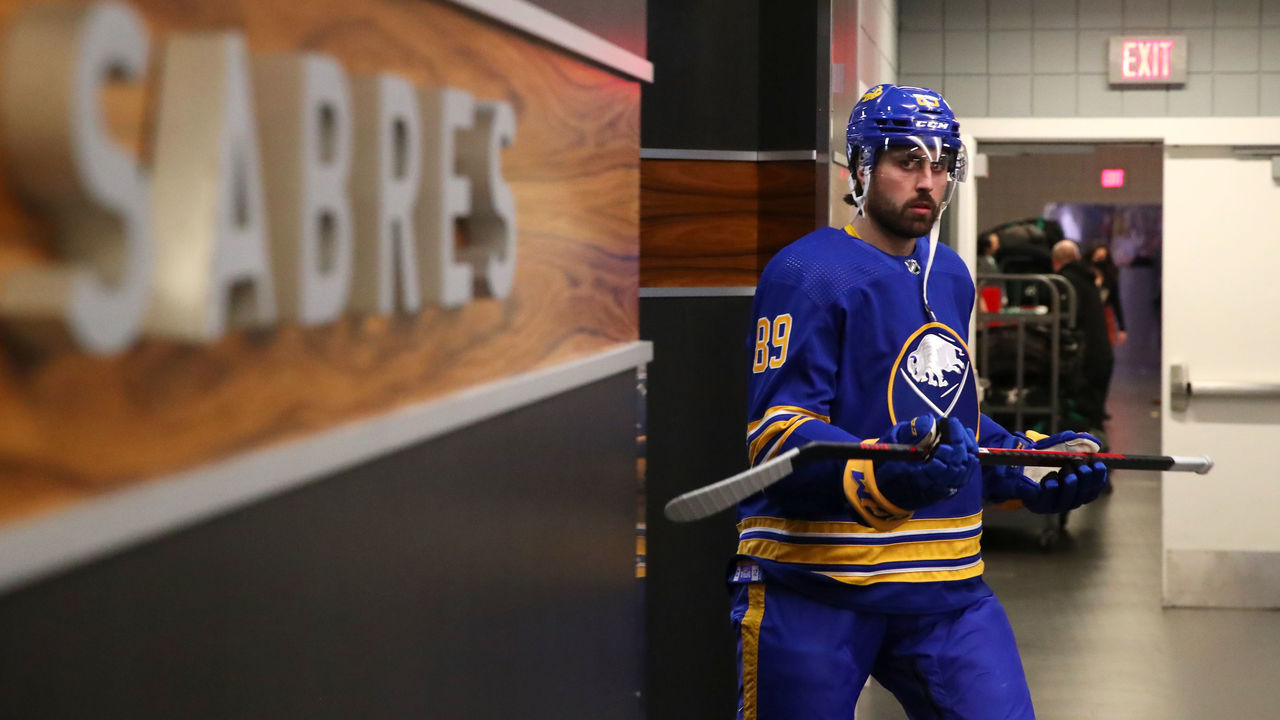
Tuch was confined to bed or the couch the first week after surgery. For a while, he couldn't do anything with the left side of his upper body. The tedious rehab was a grind and he hated not being able to pitch in around the couple's house in Summerlin, Nevada.
Training camp was taxing in a distinct way. He attended team meetings, but worked out in the gym at a different time than everybody else. He skated, but with no stick or puck.
"It was physical. The mental burden, though, that wasn't that easy either," Tuch says. During his recovery, Tuch talked with sports psychologists, first in Vegas and then in Buffalo following the trade. He wanted to learn how to "go with the flow."
"Something starts going wrong, and I'm like, 'OK, I have to do this, this, and this,'" Tuch says of an issue he's grappled with for years. He provides an example: "Like after a bad game, you're just constantly going over it in your head. Not being able to sleep that night because you just keep thinking about what you could have done differently."
The therapy helped Tuch slow down and be "flexible" with outcomes. He emerged from this stressful period - injury, recovery, trade - less anxious and stronger than ever, Edwards says proudly.
Tuch and Edwards, who's Canadian, met in early 2020 through Golden Knights defenseman Shea Theodore and his partner Mariana, Edwards' close friend. The couple, engaged this past March, is building a house in the Buffalo suburb of Clarence.

Spend a few hours with Tuch and it becomes abundantly clear why Krebs once dubbed him the Golden Knights' "connections guy." His warm personality has gravitational pull.
"I've got some pretty cool phone contacts, to say the least," Tuch says, smiling. Rapper Lil Jon is a favorite. "I got a random FaceTime from him once. It was just hilarious. He's loud and he's a lot of fun to be around. But he's genuine. He's himself." Tuch counts magician Criss Angel, comedian Carrot Top, and quarterback Josh Allen as pals, too.
Early on in his Buffalo tenure, Tuch's visited the Sabres' business office to introduce himself to random employees; attended a local marathon charity hockey game; played rock, paper, scissors with a fan during pregame warmup; hyped up Bills Mafia at a Buffalo-Pittsburgh NFL game; and started a post-win tradition of yelling "WOO!"
"He's comfortable in his own skin. He is who he is," Adams says. "That's the key to leadership - not being something you're not. It's about being authentic. The people around you pick up on that."
Scott Montagna, Tuch's most influential minor hockey coach, wholeheartedly agrees, saying, "There's no faking Al Tuch. He's in the moment."
This go-getter attitude manifests in other areas. The Tuch family charity announced this summer a $120,000 donation over three years to an upstate New York children's hospital. The AT9 Foundation supports research for pediatric cancer and helps children with special needs. "The whole world is up against these kids," Tuch says.
Some of this comes naturally to Tuch, who's often described as an "old soul." In the Golden Knights dressing room, he observed how veterans Marc-Andre Fleury, Reilly Smith, and James Neal treated people in and outside the team bubble. "I got to see firsthand, each and every day, how those guys acted as pros. That's something I heard was lacking within the organization here in Buffalo - the selflessness to mentor," Tuch says. "If I take a guy out who's on an entry-level contract, he's not paying for anything. Ever."
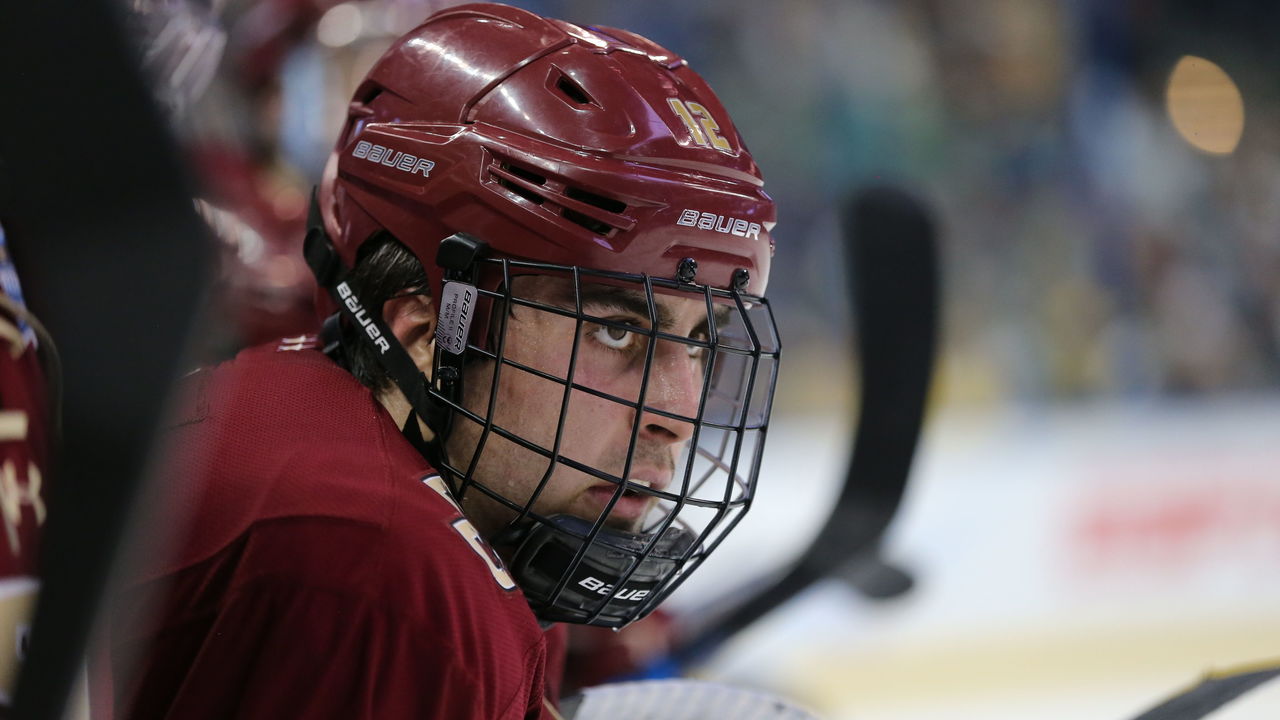
Tuch made his Sabres debut in late December and immediately collected 10 points in 10 games. He slowed down, recording 28 points over his final 40 games, but nevertheless helped linemate Thompson reach his own career highs. In March and April, the Sabres posted the 13th-best points percentage in the NHL with a 16-9-3 record.
Tuch possesses quick hands and a wicked shot. He's a 6-foot-4, 217-pound winger who's capable of playing in all situations. He's a world-class skater. These attributes were evident when he arrived at the U.S. National Team Development Program in 2013.
But, as former NTDP coach Danton Cole recalls, young Tuch needed to "understand how big and strong he could be, and what an advantage he could have if he played a certain way." In time, Tuch understood. Then, as Boston College coach Mike Ayers explains of the next step: "He started to put some muscle on and started taking some leaps."
It was skating coach Francois Methot who, in Tuch's words, "reinvented my stride" following his first season of pro hockey, which consisted of six NHL and 57 AHL games.
Granato crossed paths with but didn't coach Tuch at the NTDP. The Tuch he interacts with daily now can deceive opposing defenders through an "almost disguised or hidden" acceleration. "He's in third gear, and you're gauging him defensively, and all of a sudden he hits fifth gear," Granato says. "And you're like, 'Whoa! He just skipped over one!'"
Tuch isn't particularly young or old at 26, yet he's a proven playoff performer (33 points in 66 games) entering his sixth NHL season. And with that tantalizing skill set, Granato says, "he's nowhere near his potential."
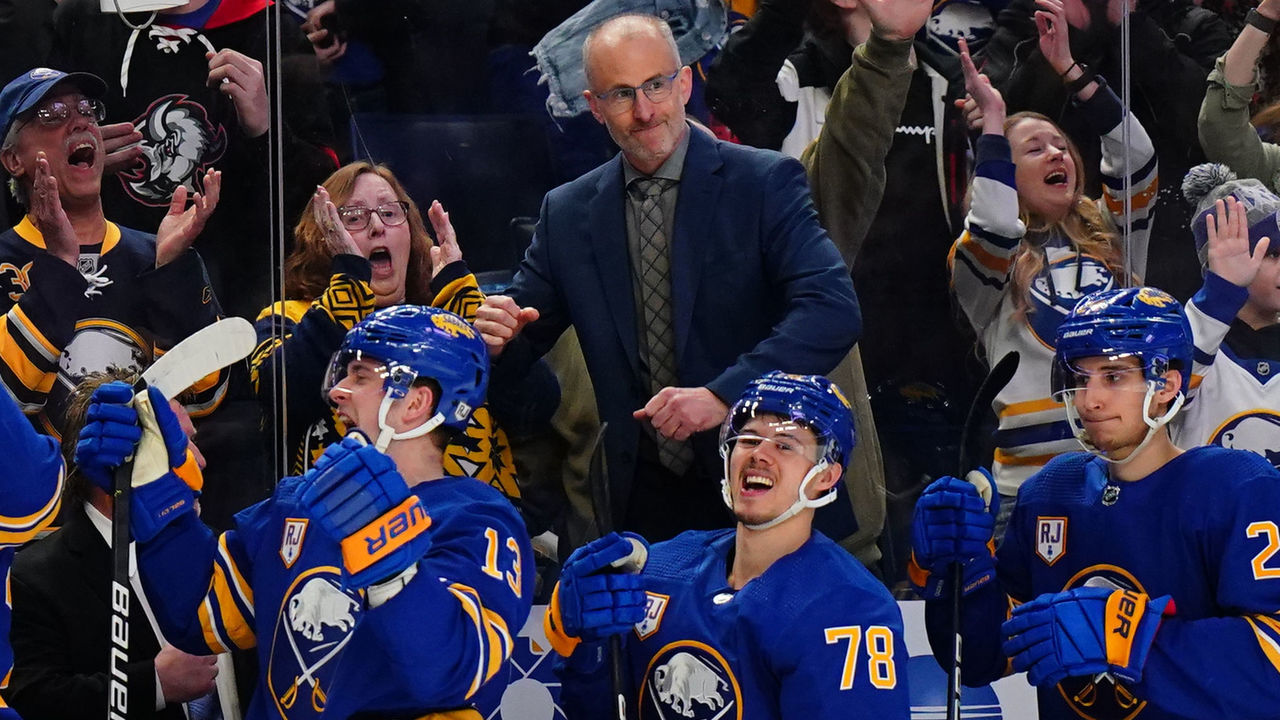
The Sabres unveiled the league's youngest opening-day roster earlier this week. Nine players - or roughly 40% of the 23-man group - are age 23 or younger. Only two, forwards Okposo and Skinner, are in their 30s, and goalie Craig Anderson is 41. And their total salary commitment, $63.9 million, is barely above the league's lower limit.
The Sabres' full embrace of a youth movement isn't a shot in the dark. Most of these players are ready for full-time NHL jobs, and the others deserve a fighting chance. Both The Athletic and Elite Prospects ranked Buffalo's prospect pool No. 1 among all teams.
The crown jewel is Owen Power, the hulking blue-liner who last season impressed in an eight-game cameo following his first overall selection in the 2021 draft. "His potential is through the roof - his size, hockey IQ, ability to see the ice," forward Dylan Cozens says, shaking his head. "Owen's situational awareness," Granato adds, "is amazing."
The buzz surrounding Power, Cozens, and other top prospects - Krebs, Jack Quinn, JJ Peterka, Matthew Savoie, Noah Ostlund, Jiri Kulich, and Devon Levi - has triggered a wave of local and national optimism not felt since Eichel's sophomore season.
A prevailing thought in league circles is that the cupboard is filled with so much talent, it'll be difficult to torpedo. The Sabres, then, will be a compelling case study over the next few years: they've drafted well, but can they develop those players properly and, in turn, break the drought?
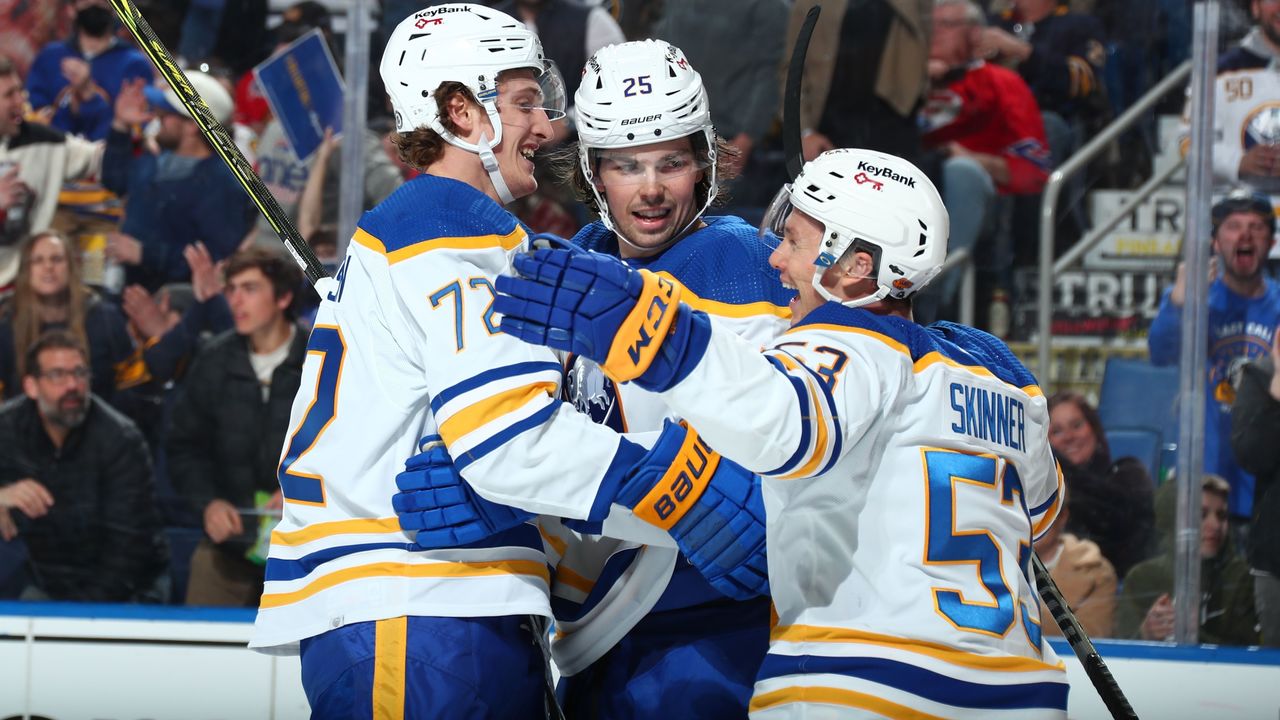
The challenge over the next six months will be to use all this optimism as a launching pad to the next stage of the build. Success or failure won't necessarily hinge on the Sabres clinching a 2023 playoff spot in a stacked Atlantic Division. Yet the good vibes pumping through the organization will dissipate quickly if the trend line stops pointing to the sky.
"We can't hit the fast-forward button and jump two levels," Adams says. "You have to go through the process and stick to the plan and the vision. And the plan and the vision for us is identifying this core group that we're going to be able to move forward with; making sure we have the right people around them; and setting the culture right so people can come in every day, get better, truly be themselves, and perform at their highest level."
By all accounts, Adams and Granato - who both signed multi-year contract extensions before the season - are in lockstep on expectations and playing style. ("Play free. Play with speed. Don't be afraid to fail," is how Cozens described it.) As for nurturing a sustainable culture, a 2013 book about the New Zealand All Blacks rugby team called "Legacy" has become an inspiration. Adams, a ferocious reader of books on leadership, business, and sports, gifted it to the players ahead of last season.
The book, Adams said, carries the "ultimate message about leaving a jersey or organization better than you found it." It was no coincidence when Okposo dropped a nearly identical line on local reporter Matthew Bove a few days before being named captain.
"What motivates me now," Okposo, 34, said of his late-career mindset, "is leaving the game and leaving this organization in a better place than I found it."
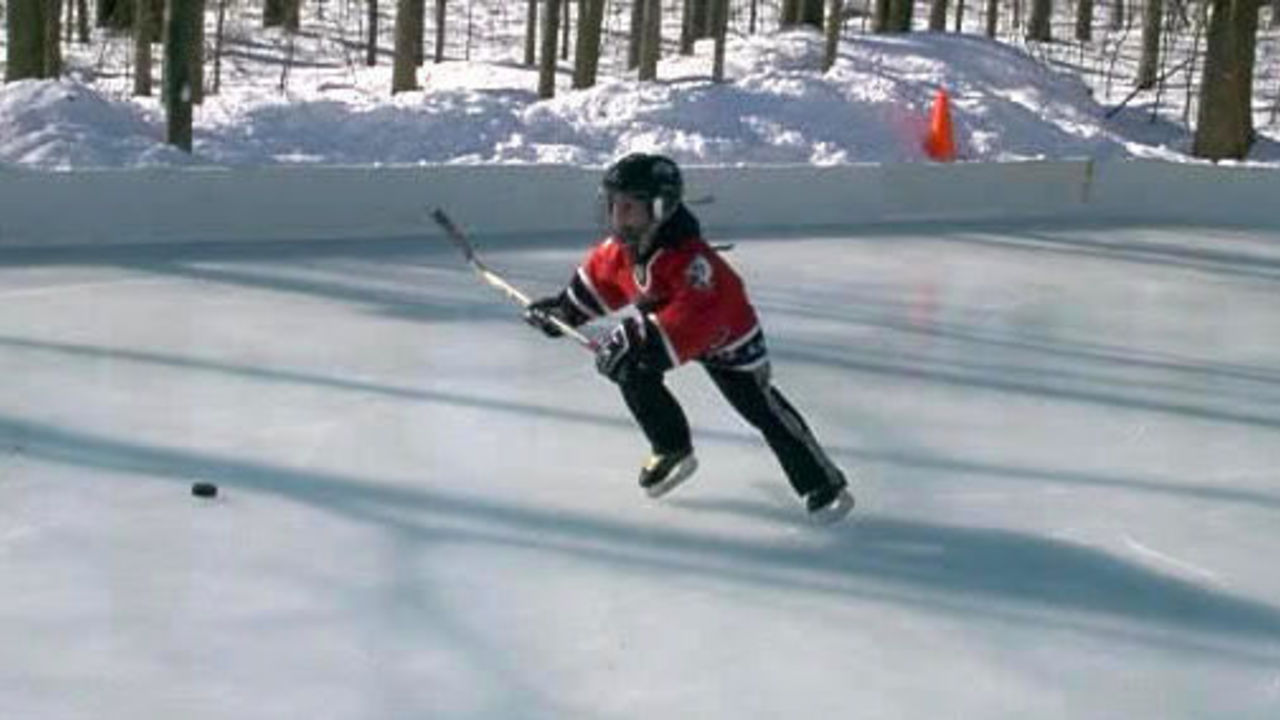
It's around 9 a.m. inside the Sabres' meal room, and Tuch has just been asked a very specific and serious question about Lil Jon. Do you drop the "Lil" when you get to know him?
"Naw," Tuch says, "you still call him Lil Jon."
Decked out in Sabres apparel - baseball cap, hoodie sweater, athletic shorts - he then grabs his coffee and crossword, waves goodbye, and disappears into a team meeting.
Later, with Edwards at his side, Tuch brings up how Michael Peca, a core piece of the 1990s Sabres now helping coach the Sabres' AHL affiliate in Rochester, sat next to him in a meeting. "Little things like that, I don't know, I get excited. Kind of like a little kid," he says.
Tuch is living out a childhood dream, welcoming the local-guy role without hesitancy. This is simply who he is - a longtime Sabres fan playing for the Sabres. Shortly after being acquired, he told Adams over steak and wine that he was "all-in."
"I felt like I knew him my entire life," Tuch says. "I feel like we were able to just jump into the conversation. It was like, I don't know, a four-hour-long dinner?"
Tuch is slated to start the season on a line with Quinn, 21, and Casey Mittelstadt, 23. Although each forward is at a different phase of his NHL life, the organization believes all three - like the vast majority of Sabres - has serious untapped potential.
As for dates circled on the calendar, Tuch can't wait for Nov. 23. The famous (infamous?) "goat head" logo jersey from Tuch's childhood is scheduled to return as an alternate jersey that night at KeyBank Center.
"That goat-head game is gonna be insane," Tuch says with an exaggerated facial expression. "If you see me and I'm shaking on the bench, you know why."
John Matisz is theScore's senior NHL writer. Follow John on Twitter (@MatiszJohn) or contact him via email ([email protected]).